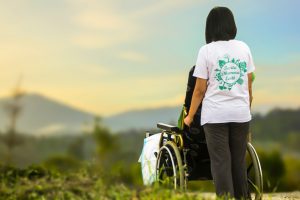The month of March is recognized as Developmental Disabilities Month in order to “increase public awareness of the needs and potential of Americans with disabilities.” March also includes the International Wheelchair Day on 3/1 when we celebrate mobility on wheels, National Trisomy Awareness Day on 3/18 when we get to wear purple to support our friends with an extra chromosome 18, World Down Syndrome Day on 3/21 when we wear cool socks to show support for those with a third copy of chromosome 21, National Cerebral Palsy Awareness Day on 3/25 when we get to wear all the green we have left over from St. Patrick’s Day, and Epilepsy Awareness Day on 3/26 when we rock our purple again to support those with Epilepsy.
The developmental disabilities community is a very personal community for me. I have been working professionally with individuals who have developmental disabilities my whole career. But six years ago, I adopted my first child with a developmental disability. My now-10-year-old daughter is blind and has an orthopedic impairment. When my older daughter had been home for two years, she convinced me that she needed a sister and we adopted my second daughter with a developmental disability. My now 8-year-old daughter has a genetic form of cerebral palsy. Then we brought home two more girls who do not have disabilities giving us a very full house!
When my older daughter first came home, people often asked me if she would ever be able to walk. They were usually shocked when I said that I didn’t know and I really didn’t care. If she didn’t walk, she would find another way to get around. My daughter did learn to walk. She was 7 years old when she started walking with a walker and 9 years old when she learned to walk independently without an assistive device. Her ability to walk was contingent on several surgeries and years of physical therapy, but she is now able to get around quite well and is a very active and happy 10 year old.
I felt the same way about her ability to talk. When I first met her at age 4, she only spoke three words (one of which was “pizza”). Now she has the vocabulary of a typical 10 year old and sings in All City Choir with her peers. But bringing home a child with a long list of diagnoses and delays, I had no idea what path we would be following and I was fully prepared for a life of communication devices and speech therapy. I often listen to her talk and realize how blessed I am to hear her voice.
Her younger sister has more significant disabilities and does still use a wheelchair to get around and a communication device to communicate. We have not given up on her therapies and would be thrilled if she was one day able to get up and walk, or able to use her voice to speak… but if she never does, we are okay with that as well. She does not need spoken words to boss around her sisters, or legs that can walk to get where she wants to go.
We often hear the word “can’t” when people talk about children with developmental disabilities, but I have found it helpful to focus instead on the “can”. It is true that my 10 year old daughter can’t see, but she CAN read. My 8yo can’t talk, but she CAN tell you what is on her mind. She can’t walk, but she CAN drive a massive power wheelchair full of fancy electronics (that costs more than my first car). Neither of them can run and jump, but they CAN play with their friends and have a great time just being kids.
In light of developmental disabilities month this March, please remember that kids with developmental disabilities are kids first. They want to be treated just like any other kid. Don’t be afraid to say hello! And don’t forget to wear green on March 25th for National CP Day!
Beth Sellers
Developmental Disabilities Support Coordinator
Harrisonburg-Rockingham Community Services Board

